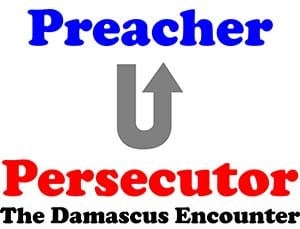Paul: Background and Call – Questions for discussion
- Fair warning. Do you believe that Paul was the most important person in the New Testament aside from Jesus Christ Himself? Why? Back before Christ came to live among us, why do you think the Jewish people of the Old Testament really needed to follow such a strict pattern of behavior? What were the advantages of this code of behavior? Now it’s time to change, and Paul is leading the way. Are you ready to follow him–just for a few days?
- A legalistic perspective. Can you think of a good reason or two why you might
 relish being known as a Pharisee during the time of Christ? How did Paul’s education and training prepare him for career as a missionary to the Gentiles? Try to imagine attending church and learning to distinguish between commands that were binding and those that should be ignored. How was Paul able to accomplish this task?
relish being known as a Pharisee during the time of Christ? How did Paul’s education and training prepare him for career as a missionary to the Gentiles? Try to imagine attending church and learning to distinguish between commands that were binding and those that should be ignored. How was Paul able to accomplish this task? - What was Paul really like? When Paul was going from synagogue to synagogue, pulling out Christians for punishment and organizing bloody campaigns to get rid of them, would you have given Paul a warm welcome to your church? How did Paul respond when he became aware of the enormity of his sinful acts against Jesus and His followers? Can any person driven by hate become an apostle of love and grace? How did Paul deal with the enormous guilt he felt for what He had done to Christ’s followers?
- Qualities of the mission task. Discuss each of the following as an objective of missionary work in Paul’s day and an equally important aspect of our work on Jesus’ behalf today: How can we—
- Open people’s eyes to the reality of Jesus and God
- Lead our listeners from the darkness of sin to the light of the gospel
- Help our audience trade Satan’s power with God’s
- Understand and believe in the forgiveness of sin
- Encourage others to join us in worshiping God
5. Leading to conversion. As Paul entered the most active phase of his career as a Christian missionary, what did he do besides “preach the message”? What can we learn from Paul in the ways he dealt with new members and the churches that sprang up wherever he went? Can we learn a lesson from Paul about the importance of follow-up after an evangelistic campaign? What about respect for various cultures? How did Paul instill in the new converts a love for God and for each other that surpassed all considerations of culture or practice?
6. What if you were Jewish? Imagine what it was like as a firm Jewish believer, just converted to Christianity, to see people from other countries and districts claiming to have an understanding of Jesus and what it meant to walk with Him. What feelings did hard-core Jewish people have seeing their time-honored traditions brushed aside in order to establish a more unified and cross-cultural religious following? Do we ever feel that way today?

Good questions Joyce!
Question #2 brings to mind the thought that — Those that are forgiven most, are those that love the most, and those that love the most will, like Paul, be able to say, “I labored more abundantly than they all”.(1Cor 15:10.)
I think this thought in Great Controversy magnifies the principle:
“Nearest the throne [of God] are those who were once zealous in the cause of Satan, but who, plucked as brands from the burning, have followed their Saviour with deep, intense devotion…” (Great Controversy p.665)
This, in my view, describes Paul’s experience well.